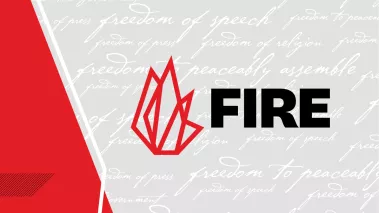Table of Contents
Victory: Pro-Life Student Group Finally Recognized at University of Arizona

TUCSON, Ariz., April 21, 2010—In a victory for freedom of association, the University of Arizona has reversed course and granted its Students for Life (SFL) group official recognition. The decision gives the group equal access to university resources. SFL's application was initially denied by UA's student government because the group's proposed constitution required that members share beliefs about the sanctity of human life. After the student government denied recognition to his group, SFL founder Jeremiah Lange came to the Foundation for Individual Rights in Education (FIRE) for help.
"FIRE is pleased that the University of Arizona has recognized its obligation to uphold the First Amendment right to freedom of association guaranteed to its students," FIRE Vice President Robert Shibley said. "When students form groups around shared beliefs, they exercise a core constitutional right. A diversity of belief-based groups enhances the marketplace of ideas on campus."
FIRE asked the U.S. Supreme Court to acknowledge this right of student groups to freely associate in a friend-of-the-court brief in Christian Legal Society v. Martinez, which was argued before the Justices on Monday.
UA's application procedure for new student groups requires submission of a proposed constitution and a nondiscrimination statement. Lange submitted an application for SFL that satisfied the written guidelines of the Associated Students of the University of Arizona (ASUA), the student government. SFL also included a requirement that "member[s] must agree to stand by the princip[le]s that life is sacred and that the intentional killing of human beings through abortion, euthanasia, and murder, and all forms of eugenics are morally reprehensible." The application was denied in a February 25, 2010, e-mail to Lange in which ASUA Club and Organization Standards Board Director Jarrett Benkendorfer informed Lange that "organizations cannot require participants to fulfill or abide by specific principles." Benkendorfer informed Lange that the belief-based requirement was "unnecessary" because "students holding shared views with your club will be attracted to your organization."
In a March 15 letter to UA President Robert N. Shelton, FIRE pointed out that no ASUA regulations specified that student groups were prohibited from requiring voting members to share the group's organizing beliefs, contrary to what Benkendorfer had alleged. Further, FIRE informed Shelton that preventing Lange and SFL from making belief-based membership choices was a denial of the group's First Amendment right to freedom of association. As the Supreme Court made clear in Roberts v. United States Jaycees (1984), "freedom of association plainly presupposes a freedom not to associate." FIRE expressed doubt that recognized student groups including the College Republicans, Students for Justice in Palestine, Students Organized for Animal Rights, Voices of Opposition, Liberty in North Korea, Young Democrats, and Movimiento Estudiantil Chicano de Aztlán were aware that they were unable to require members to share their central beliefs.
If the Supreme Court rules against a similarly situated student group in Christian Legal Society v. Martinez, the ability of belief-based groups to exist and maintain their expressive identity on campuses around the country will be in jeopardy.
In a March 29 response, Arizona Student Unions Executive Director Bill Shiba avoided answering FIRE's constitutional concerns, but asked Lange to reapply. On April 1, FIRE again wrote President Shelton, noting the inadequacy of Shiba's reply and asking that Shelton "personally ensure that ASUA respects the constitutional right of UA students to assemble with others around shared beliefs." In a reply of April 14, Shiba informed FIRE that SFL's application had been accepted.
"Public universities like the University of Arizona cannot deny students their First Amendment right to meet with others of like mind to advance a message of their own choosing," said Will Creeley, FIRE's Director of Legal and Public Advocacy. "The university's initial denial of recognition to Students for Life is a troubling example of what will happen across the country if the Supreme Court permits public universities to render freedom of association an empty right on campus. Fortunately, the University of Arizona has done the right thing by recognizing that campus life benefits from hosting a multitude of groups expressing a multitude of viewpoints."
FIRE is a nonprofit educational foundation that unites civil rights and civil liberties leaders, scholars, journalists, and public intellectuals from across the political and ideological spectrum on behalf of individual rights, due process, freedom of expression, academic freedom, and rights of conscience at our nation's colleges and universities. FIRE's efforts to preserve liberty at the University of Arizona can be viewed at thefire.org.
CONTACT:
Will Creeley, Director of Legal and Public Advocacy, FIRE: 212-582-3191; will@thefire.org
Robert N. Shelton, President, University of Arizona: 520-621-5511; robert.shelton@arizona.edu
Recent Articles
FIRE’s award-winning Newsdesk covers the free speech news you need to stay informed.

AI is new — the laws that govern it don’t have to be

Defending free speech: FIRE and Substack partner to protect writers in America

Brown University targets student journalist for sending DOGE-like emails
